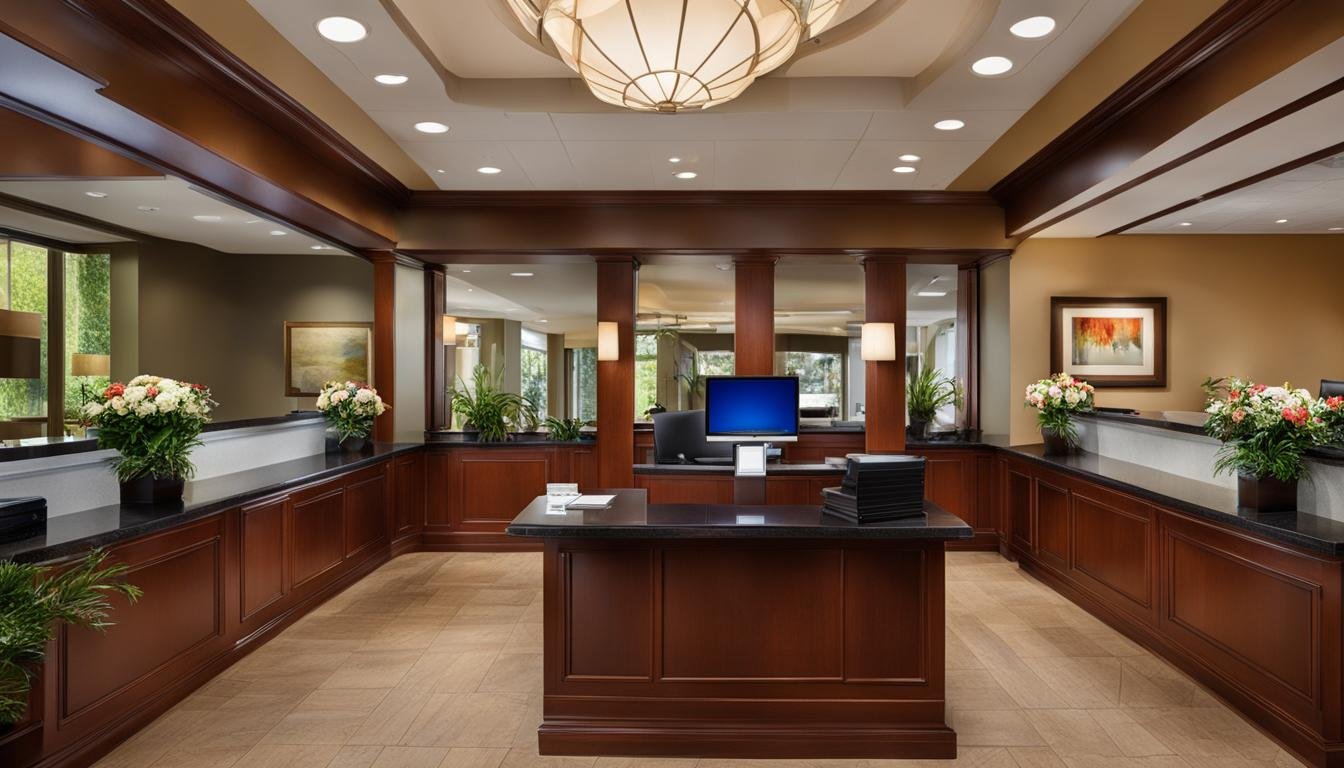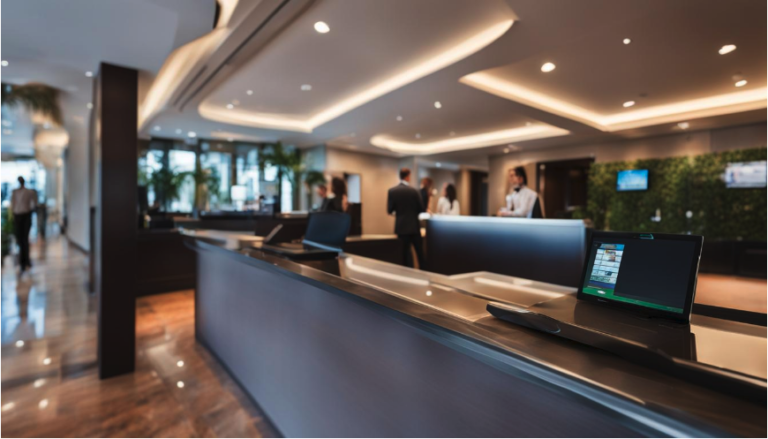Unlock Success: Key Elements of Front Desk Operations
Front desk operations, whether in a hotel or residential community, are essential for ensuring smooth operations and exceptional customer service. From managing guest inquiries to coordinating services, front desk staff play a crucial role in creating a positive experience for residents and visitors.
In this article, we will explore the key elements that contribute to the success of front desk operations. From comprehensive training programs to harnessing technology, each aspect plays a vital role in enhancing the overall efficiency and effectiveness of front desk operations.
Key Takeaways:
- Comprehensive training and development programs are essential for equipping front desk staff with the skills they need to provide excellent customer service.
- Professionalism and creating a welcoming arrival experience are crucial for making a positive first impression on residents and visitors.
- Proactive communication helps in identifying and resolving issues promptly, enhancing customer satisfaction.
- Tailoring and customizing services to meet individual needs contribute to a personalized and exceptional experience for residents.
- Harnessing technology can streamline processes, automate tasks, and provide real-time reporting for efficient front desk operations.
Comprehensive Training and Development Program
One of the key elements for success in front desk operations is the implementation of a comprehensive training and development program for front desk staff. This program ensures that the staff is equipped with the necessary skills and knowledge to provide excellent service to guests and residents.
At Stratton Amenities, they prioritize continuous training and development to keep their front desk staff up-to-date with the latest industry trends and best practices. They offer both virtual learning and on-the-job training opportunities to cater to different learning styles and preferences. Through virtual learning platforms, staff members can access training modules and resources at their own pace, allowing for flexibility in their learning journey. On-the-job training, on the other hand, provides practical hands-on experience and allows staff to apply their knowledge in real-life scenarios.
The training program covers various aspects of front desk operations, including guest service skills, conflict resolution skills, emergency response training, and system knowledge. By investing in continuous training and development, Stratton Amenities ensures that their front desk staff is well-prepared to handle a wide range of situations and provide exceptional service to guests and residents.
Table: Front Desk Training Topics
| Training Topics | Description |
|---|---|
| Guest Service Skills | Covers techniques for providing excellent customer service, including communication, problem-solving, and interpersonal skills. |
| Conflict Resolution Skills | Teaches strategies for effectively resolving conflicts and handling difficult situations with guests. |
| Emergency Response Training | Prepares staff to handle emergency situations, such as fire alarms, medical emergencies, or natural disasters. |
| System Knowledge | Ensures that staff members are proficient in using the hotel’s reservation system, property management system, and other relevant software. |
| Hospitality Training | Covers the fundamentals of the hospitality industry, including hotel operations, guest expectations, and industry trends. |
“Continuous training and development are essential for front desk staff to deliver exceptional service to guests and residents. At Stratton Amenities, we prioritize the growth and professional development of our team members through comprehensive training programs. Our virtual learning platforms and on-the-job training opportunities ensure that our staff is equipped with the necessary skills and knowledge to exceed guest expectations and provide personalized experiences.”
Cultivating Professionalism and a Welcoming Arrival Experience
When it comes to front desk operations, cultivating professionalism and creating a welcoming arrival experience are essential. At Stratton Amenities, we understand the importance of maintaining a polished image and respecting privacy while upholding the highest standards of conduct and confidentiality. Our front desk teams are trained to provide warm greetings, prompt assistance, and friendly interactions to create a positive and welcoming atmosphere for both residents and visitors.
Professionals at the front desk play a crucial role in shaping the first impression guests have of our multifamily communities. With their professionalism and attention to detail, they ensure that every resident and visitor feels valued and cared for from the moment they arrive. By delivering exceptional customer service and addressing inquiries with respect and courtesy, our front desk teams contribute to an overall enhanced living experience for all.
Our commitment to professionalism extends beyond the initial arrival experience. We prioritize ongoing training and development for our front desk staff to continuously improve their skills and knowledge. This dedication to excellence enables our teams to handle diverse requests with efficiency and expertise, ensuring that every interaction is conducted with professionalism and a genuine desire to meet the needs of our residents and visitors.
At Stratton Amenities, we believe that professionalism and a welcoming arrival experience are the cornerstones of successful front desk operations. By fostering a culture of respect, warmth, and prompt assistance, we create an environment where residents and visitors feel valued and cared for throughout their stay. Our dedication to professionalism ensures that every interaction, from warm greetings to friendly interactions, contributes to a positive and memorable living experience.
Proactive Communication
Effective communication is a crucial aspect of front desk operations, but being proactive takes it to the next level. Proactive communication involves anticipating the needs and expectations of residents and visitors, actively listening to their concerns, and identifying potential problems before they arise. By practicing proactive communication, front desk staff can build strong relationships with the community, enhance efficiency, and improve satisfaction levels.
One of the key elements of proactive communication is active listening. It involves giving full attention to the speaker, understanding their perspective, and providing thoughtful responses. By actively listening, front desk staff can better identify the underlying needs and concerns of residents and visitors, leading to more effective problem-solving and service delivery.
In addition to problem identification, proactive communication facilitates relationship building. By engaging in friendly and meaningful interactions, front desk staff can create a welcoming and personalized experience for residents and visitors. This not only enhances customer satisfaction but also fosters a sense of belonging and loyalty within the community.
Moreover, proactive communication is essential for efficiency improvement. By addressing potential issues before they escalate, front desk staff can streamline operations, reduce delays, and ensure swift resolution of problems. This not only saves time but also enhances the overall experience for residents and visitors.
Tailoring and Customizing Services
When it comes to front desk operations, personalized services tailored to the unique needs of residents and visitors are essential. Stratton Amenities understands the importance of collaboration with property management to ensure that every individual’s requirements are met. With a diverse range of requests that can vary from simple to complex, the front desk team at Stratton Amenities prides itself on flexibility and responsiveness.
By working closely with property management, the front desk team is able to gather valuable insights into the specific needs of each residential community. This collaboration allows them to offer a wide array of services that cater to the diverse preferences of residents and visitors. Whether it’s arranging transportation, providing recommendations for local attractions, or assisting with special requests, the front desk team at Stratton Amenities is dedicated to delivering exceptional experiences tailored to the individual.
Customized Services at Stratton Amenities
- Transportation arrangements
- Concierge services
- Local recommendations
- Restaurant reservations
- Event planning
- Special requests
With their commitment to tailoring and customizing services, the front desk team at Stratton Amenities goes above and beyond to ensure that every resident and visitor feels welcomed and cared for. Their ability to adapt to the unique needs of each individual sets them apart and enhances the overall experience of staying in a residential community.
At Stratton Amenities, personalized services are more than just a buzzword – they are at the core of their approach to front desk operations. By collaborating with property management, offering a diverse range of services, and staying responsive to the needs of residents and visitors, they create an environment where everyone feels valued and well taken care of.
Harnessing Technology for Efficiency
Technology plays a significant role in front desk operations, enabling efficiency and improved guest experiences. By leveraging automation and streamlining processes, hotels can optimize their operations and deliver exceptional service. Real-time reporting allows for quick and accurate decision-making, ensuring that front desk staff can address guest needs promptly and effectively.
Welcome greetings are vital in creating a positive first impression. With technology, hotels can implement automated welcome messages that are personalized and tailored to each guest, enhancing their arrival experience. Quick service is also facilitated through technology, with features like self-check-in kiosks, mobile concierge apps, and virtual assistance, allowing guests to expedite their check-in process and access information easily.
Problem-solving is an essential skill for front desk staff, and technology provides valuable tools to assist in this area. With digital platforms for guest communication, issues can be promptly addressed, and resolutions can be tracked, ensuring that no guest concern goes unnoticed. Additionally, technology can provide front desk staff with access to comprehensive databases and resources, enabling them to find solutions quickly and efficiently.
“Technology has revolutionized the way front desk operations are conducted, enabling hotels to provide seamless and efficient experiences for their guests. By harnessing automation, streamlining processes, and utilizing real-time reporting, hotels can optimize their operations, enhance guest service, and stay ahead in the competitive hospitality industry.”
Overall, technology empowers front desk operations by improving efficiency, enhancing guest interactions, and enabling effective problem-solving. By embracing technological advancements, hotels can create a seamless and personalized guest experience that exceeds expectations.
Importance of Location in Hotel Success
The location of a hotel is a critical factor that can greatly influence its overall success. When choosing a location for a hotel, several key considerations come into play. Understanding these factors is essential for attracting both domestic and international visitors, attracting business travelers, and maximizing the potential for success in the hospitality industry.
Attracting Tourists
A prime location that appeals to tourists is crucial for a hotel’s success. The proximity to popular tourist attractions, landmarks, and entertainment venues can greatly enhance the hotel’s appeal. Travelers often prioritize convenience and accessibility when selecting accommodation, making a strategic location near attractions a significant advantage in attracting tourists.
Attracting Businesses
For hotels targeting business travelers, the location should be conveniently situated near key business districts, conference centers, and corporate headquarters. Easy accessibility and proximity to these areas make it more appealing for business travelers, who value convenience and time efficiency.
Group Business
Hotels with a location suitable for hosting group events and conferences have a competitive advantage. A well-connected location with ample meeting spaces and accommodation options can attract businesses looking to host events or conferences, resulting in increased revenue and occupancy rates.
| Factors to Consider in Hotel Location Selection | Points of Consideration |
|---|---|
| Demographics of Visitors | Understanding the demographics of visitors, such as the ratio of domestic to international travelers, can help determine the location’s suitability. |
| Renovation Potential | If a hotel location requires extensive renovations or updates, it may impact the overall success and profitability of the establishment. |
| Competition Analysis | Assessing the competition in the area is crucial to identify opportunities for differentiation and develop a competitive advantage. |
| Accessibility and Transportation | Easy accessibility and convenient transportation options, such as proximity to airports, train stations, and public transportation, are important considerations for travelers. |
The Psychological Impact of Front Desk Interaction
Front desk interaction plays a crucial role in guest satisfaction and overall hotel experience. It goes beyond mere transactional exchanges and can have significant psychological effects on guests. Understanding the impact of front desk interaction is essential for hotels to ensure a positive emotional connection with their guests.
One important psychological phenomenon related to front desk interaction is the Halo Effect. This cognitive bias occurs when guests form an overall positive impression of a hotel based on their initial interaction with the front desk staff. A warm and friendly greeting, prompt assistance, and attentive service can create a halo effect, influencing guests’ perception of the entire hotel and enhancing their satisfaction.
Social interaction at the front desk also influences guests’ emotional state. Friendly and personalized interactions can create a sense of belonging and make guests feel valued. On the other hand, cold or indifferent interactions can lead to feelings of frustration or dissatisfaction. Emotional contagion, where the emotions of front desk staff are unconsciously transferred to guests, further amplifies the impact of social interactions at the front desk.
Consistency and predictability in front desk interactions are crucial for guest satisfaction. Guests appreciate a seamless and reliable experience when checking in or seeking assistance. Front desk staff who consistently deliver high-quality service and meet guests’ expectations contribute to a positive emotional state and overall satisfaction. Conversely, inconsistent or unpredictable service can lead to frustration and disappointment.
Samples of guest complaints regarding front desk interactions:
“I felt like the front desk staff was not attentive to my needs and seemed more interested in their conversation than helping me.”
“The front desk clerk was rude and dismissive when I asked for additional information. It really put a damper on my stay.”
“I was expecting a warm welcome, but the front desk staff barely acknowledged my presence. It made me question whether I had made the right choice in booking this hotel.”
Effective problem-solving and complaint handling at the front desk also significantly impact guest satisfaction. Guests appreciate when their concerns are heard, addressed promptly, and resolved to their satisfaction. The ability of front desk staff to empathize, take ownership of issues, and find suitable solutions can turn a potentially negative experience into a positive one, leaving guests feeling valued and well taken care of.
Table: Impact of Front Desk Factors on Guest Satisfaction
| Front Desk Factors | Impact on Guest Satisfaction |
|---|---|
| Warm and friendly greetings | Positive halo effect, enhanced satisfaction |
| Cold or indifferent interactions | Feelings of frustration or dissatisfaction |
| Consistent and predictable service | Positive emotional state, increased satisfaction |
| Inconsistent or unpredictable service | Frustration and disappointment |
| Effective problem-solving and complaint handling | Positive resolution, increased satisfaction |
Understanding the psychological impact of front desk interaction allows hotels to develop strategies that prioritize guest satisfaction. By training front desk staff in warm and personalized interactions, ensuring consistency and predictability, and equipping them with problem-solving skills, hotels can create positive emotional connections with their guests, leading to enhanced satisfaction and loyalty.
Leveraging Acoustic Emotion Analysis for Hotel Front Desk Interaction
Acoustic emotion analysis is a revolutionary technology that is transforming the way hotels approach front desk interaction. By utilizing advanced audio analytics and machine learning algorithms, hotels can gain valuable insights into a guest’s emotional state during their stay. This technology enables hotel staff to provide personalized service, swift conflict resolution, and proactive problem-solving.
With acoustic emotion analysis, hotels can accurately gauge a guest’s emotions based on their voice tone, pitch, and other vocal cues. This allows staff to tailor their approach and communication style to match the guest’s mood, ultimately enhancing their experience. Whether a guest is feeling excited, anxious, or frustrated, this technology enables front desk personnel to respond with empathy and attentiveness.
Acoustic emotion analysis enables hotels to go beyond traditional customer service and truly connect with their guests on an emotional level. By understanding and responding to a guest’s emotions, hotels can build stronger relationships, increase guest satisfaction, and foster loyalty.
In addition to personalized service, acoustic emotion analysis also facilitates swift conflict resolution. By identifying changes in a guest’s emotional state during conversations, hotel staff can proactively address any potential issues or concerns before they escalate. This not only ensures guest satisfaction but also minimizes negative word-of-mouth and potential online reviews.
Furthermore, acoustic emotion analysis can be leveraged for staff training and improvement. By analyzing recordings of front desk interactions, hotels can identify areas where staff may need additional training or support. This technology enables ongoing performance evaluation and helps optimize the skills and capabilities of the front desk team.
Key Benefits of Acoustic Emotion Analysis:
- Personalized service based on a guest’s emotional state
- Swift conflict resolution through proactive problem-solving
- Improved guest satisfaction and loyalty
- Enhanced staff training and performance evaluation
| Benefits | Explanation |
|---|---|
| Personalized service based on a guest’s emotional state | Acoustic emotion analysis allows front desk staff to tailor their interactions to match a guest’s emotions, providing a personalized and empathetic experience. |
| Swift conflict resolution through proactive problem-solving | By identifying changes in a guest’s emotional state, hotels can address potential conflicts before they escalate and find proactive solutions. |
| Improved guest satisfaction and loyalty | Responding to a guest’s emotions helps create a positive and memorable experience, leading to higher satisfaction levels and increased guest loyalty. |
| Enhanced staff training and performance evaluation | Acoustic emotion analysis enables hotels to analyze front desk interactions, identify areas for improvement, and provide targeted training to enhance staff performance. |
By leveraging acoustic emotion analysis, hotels can elevate their front desk operations and deliver exceptional customer experiences. This technology empowers staff to provide personalized service, resolve conflicts swiftly, and continuously improve their skills. With a deeper understanding of guests’ emotions, hotels can forge stronger connections, build loyalty, and stay ahead in the competitive hospitality industry.
Conclusion
Front desk success in the hospitality industry relies on several key elements. Comprehensive training, professionalism, proactive communication, and tailoring services are essential for creating personalized experiences that exceed guest expectations. Additionally, harnessing technology, understanding the importance of location, and considering the psychological impact of front desk interaction are crucial.
When it comes to front desk success, group business plays a significant role. By attracting and catering to group reservations, hotels can increase revenue and occupancy rates. Ensuring safety and security, effective communication, strong decision-making skills, and meticulous attention to detail are also essential for providing a superior guest experience.
Ultimately, by prioritizing these key elements, hotels can unlock success and differentiate themselves in a competitive market. The front desk serves as the face of the hotel, and by delivering exceptional service at every interaction, hotels can cultivate loyalty, positive reviews, and repeat business. With a focus on continuous improvement and a commitment to delivering memorable experiences, front desk operations can elevate the overall guest and resident experience.







